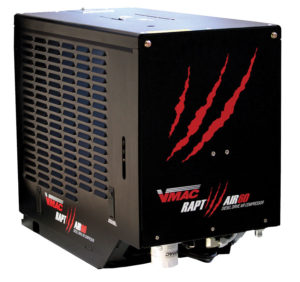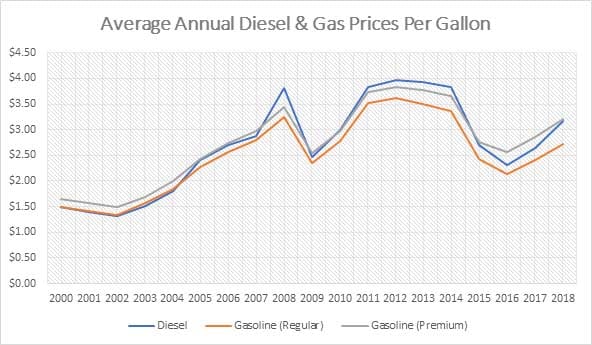5 Reasons Diesel Air Compressors Are Still Popular
In North America and Europe, there’s always been a market for diesel vehicles and air compressors. Even as new technologies emerge, diesel has remained a favorite fuel for many operators. In this article, we’re going to share 5 reasons diesel air compressors are still popular.

D60 Diesel Driven Air Compressor
5. Operators Drive Diesel Vehicles
Nobody wants to fill up with two different types of fuel. The most common reason an operator will choose a diesel air compressor is because they drive a diesel vehicle. Choosing an air compressor that also requires diesel is simple, convenient, and reduces the risk of an accidental mix-up at the pumps. Plus, some air compressors—like the VMAC D60—can be plumbed directly into the vehicle’s fuel source. It doesn’t get easier than that!
4. High Flash Point Prevents Accidents
Nobody likes to explode. That’s just a fact and diesel air compressors are safer in environments where random sparks may occur.
The flash point is the temperature at which a spark would cause material to ignite. Gasoline has a flash point of -45°F (-42.8°C), which means it can ignite in any temperature when a spark occurs. By contrast, #2 diesel—the most common type of diesel for road vehicles—has a flash point of 125°F (51.7°C). That means the diesel already needs to be warmed to 125°F (51.7°C) before it can spark.
Diesel engines compress air to create this heat internally, allowing the diesel fuel to ignite within the engine. However, surrounding temperatures rarely reach this level of heat, which helps minimize the extent of the damage if an accident occurs. It also makes diesel fuel a safer material to store.
Flash Point of Common Fuels
| Fuel | Fahrenheit Flash Point (Min.) |
Celsius Flash Point (Min.) |
|---|---|---|
| #1 Diesel | 100°F | 37.8°C |
| #2 Diesel | 125°F | 51.7°C |
| #4 Diesel | 130°F | 54.4°C |
| Biodiesel | 266°F | 130°C |
| Gasoline | -45°F | -42.8°C |
| Ethanol | 55°F | 12.8°C |
| Propane | -156°F | -104.4°C |
| Kerosene | 100°F | 37.8°C |
| Jet fuel | 100°F | 37.8°C |
3. Better Mileage Per Gallon
Throughout history, diesel and gasoline prices have risen and fallen together. The price per gallon trends are very similar and these fuel sources consistently follow the same trajectory:

At first glance, gasoline may seem like the smarter fuel choice—until you factor in mileage.
Diesel is denser and contains more energy, which makes it a 25 to 30% more efficient fuel source than gasoline. This translates to notably better fuel economy as each gallon of diesel goes up to 30% further than gas would. As long as fuel costs remain similar, diesel fuel is the smarter financial choice.
2. Diesel Engines Are Hardy & Reliable
…At least, that’s their reputation. You will find advocates on both sides of the diesel vs. gasoline camp, but diesel engine makers like Kubota have spent more than a century marketing the diesel engine as a hardy, reliable option. And it’s worked! A lot of consumers have bought into this reputation and genuinely believe diesel engines are the superior option.
Of course, whether that’s true really depends on the specific engine. There are great diesel engines and there are low quality diesel engines, and you’ll find a range of quality in gasoline engines too. Do your research and be sure to choose an air compressor—diesel or gas—powered by a high-quality engine.
1. Some People Just Love Diesel
We all know someone who just can’t get enough of diesel vehicles and machines. While nobody is declaring undying loyalty to gasoline, there’s just something about diesel that draws a long-lasting fan base.
Diesel fans are passionate and unrelenting in their opinion…. Perhaps it’s the reasons listed above or maybe it’s something else entirely. Whatever the reason, there’s one thing we know for sure: diesel air compressors are an excellent choice.
Learn more about the diesel air compressors in these articles:

